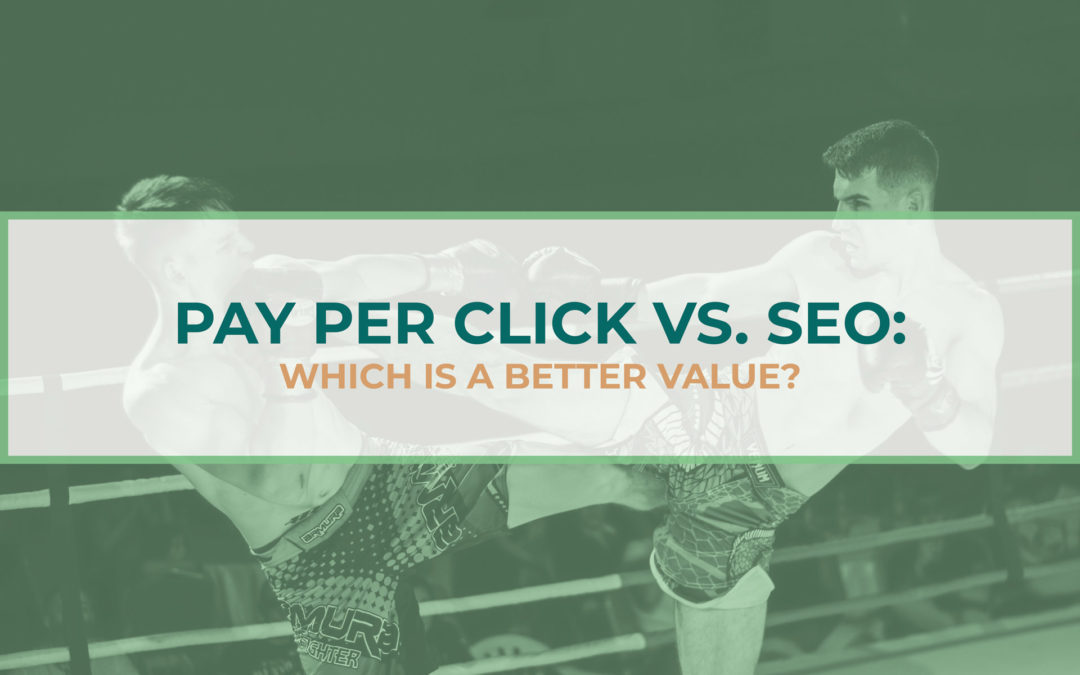The tug-of-war for many digital marketers and small business owners in charge of their marketing — which drives more leads: pay-per-click advertising or organic SEO?
Last Updated: September 5, 2022
The ongoing pay-per-click and SEO debate is a very heated one in the digital marketing community. Here at Mountain Mojo Group, our team is constantly asked by our Clients, which is a better value for my marketing dollars: SEO or pay-per-click (or PPC)?
To answer that question in a quick and simple fashion, organic SEO is a better value long-term, and PPC is better for immediate conversions, sales, or phone calls…but at a higher cost than organic SEO. Let’s outline the benefits and circumstances for using each of these marketing tactics so you can see first-hand which is better for your business and your marketing goals.
What’s the difference between PPC and organic SEO?
PPC is a method of digital advertising where a business will pay ad providers like Google Ads or Bing Ads a small fee each time their ad is clicked on by users. Organic SEO is the process of getting traffic from the “free” or “natural” search results on search engines. Basically, PPC is pay-to-play: you get up in the rankings by paying, organic SEO is done through free sources and techniques. Here’s a visual that might help explain the difference between PPC and organic SEO on Google:
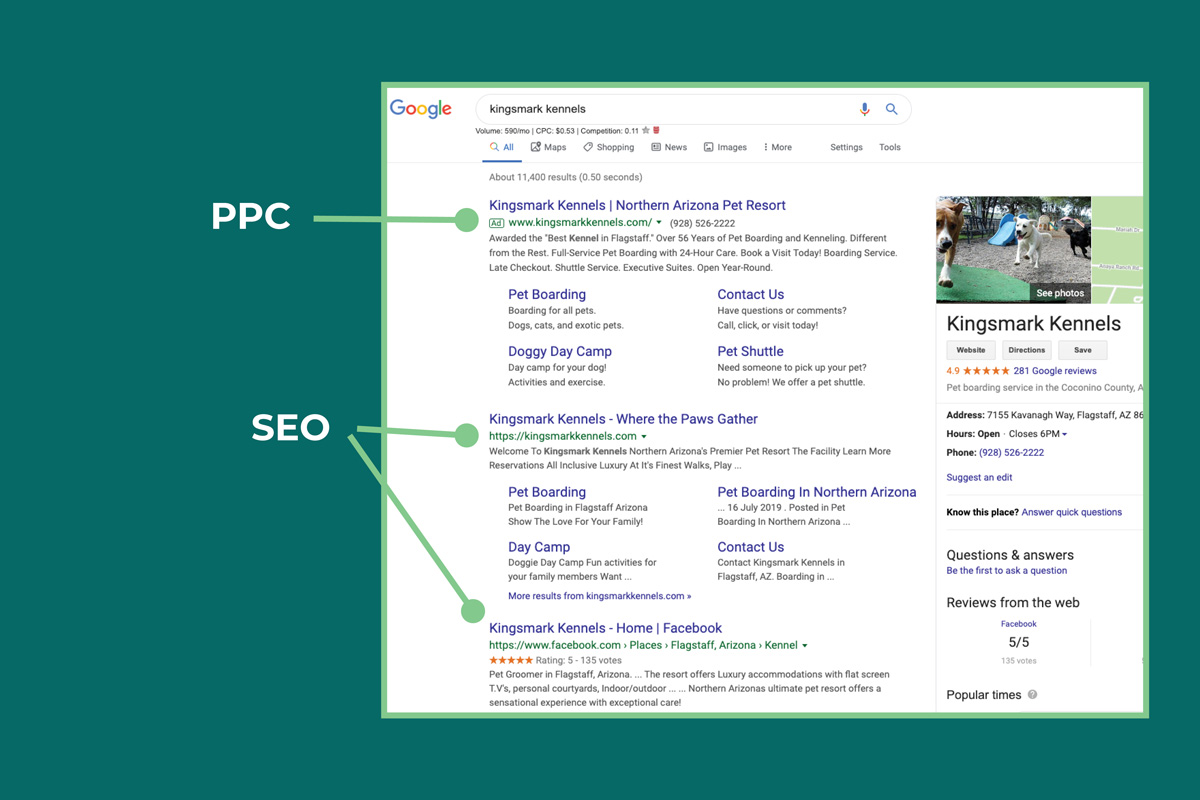
PPC: the benefits, drawbacks, and ideal situations
Known for its “laser targeted” and short-term approach, PPC is a great strategy for businesses looking to source immediate leads and customers.
Benefits of PPC for your business
Rise to the top of Google with little effort
The biggest advantage to using PPC in your marketing strategy is that it allows you to rise to the top of Google for your users’ searches with little effort. In other words, you can just “buy” your way to the top. It’s no surprise to find out that the top paid position through Google Ads gets twice as many clicks than the next one down.
Immediate leads and conversions
With PPC, there is no waiting around for your SEO and content team to build new landing pages, write content, or do keyword research. Once you build and launch a campaign, within a few days, you can expect users to start clicking on your ads and poking around on your website. Assuming your website landing pages have engaging content and plenty of calls-to-action, your PPC campaign should start driving leads and conversions in no time.
Crack into new markets and services
Want to start selling your new widget in Phoenix? Offering a new service in your local neighborhood? Build a new PPC campaign, keyword funnel, and off you go! While a campaign will perform better with a good landing page and copy related to that new product, service, or location, you can still launch a campaign without it. PPC allows you to be flexible with what you market online- which is often months ahead of what your SEO and organic content can do.
Compete with the “big dogs”
At Mountain Mojo Group, our team loves to beat and outrank Amazon with our client’s products whenever we can- and with a good PPC campaign, you can too! While Amazon spends an incredible $29,100,000 a month on Google Ads alone (or over $970,000 a day), with good management of your campaign, the right keywords, a good landing page, and a reasonable daily budget, you can blow right past Amazon, Etsy, Home Depot, or whoever else is considered the “big dog” in your industry.
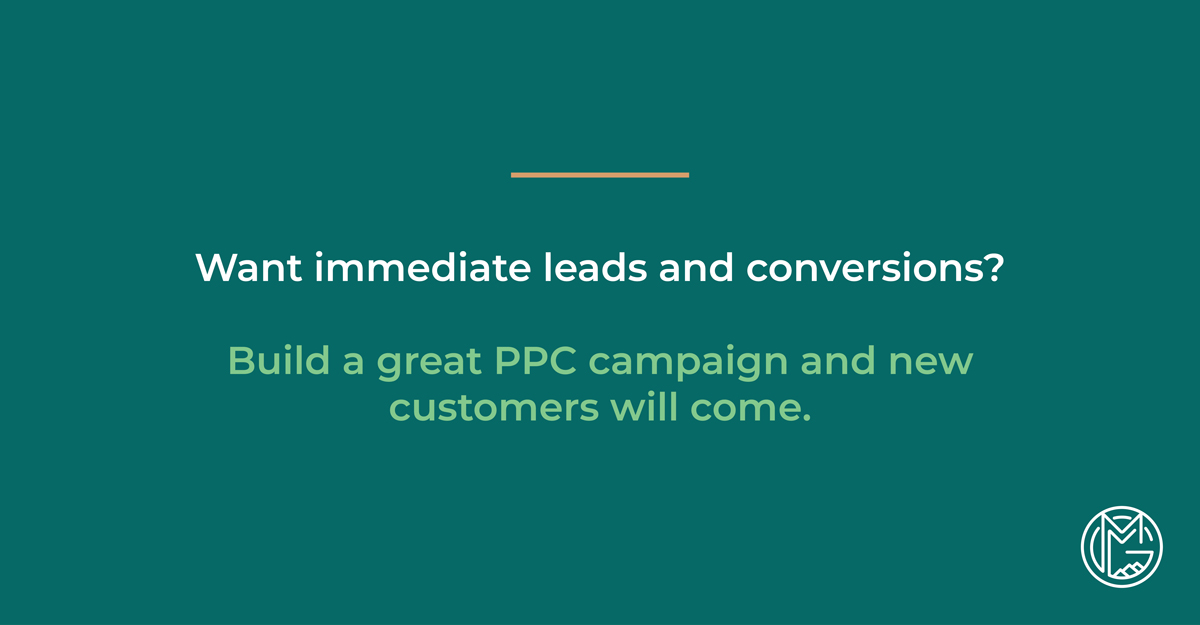
Drawbacks of PPC for your business
Pay to play
The biggest issue we have with paid advertising through PPC is that it is a paid source. If you want a Google Ads campaign, you have to pay for it. And typically, the bigger your budget is, the better your results are. Amazon is no stranger to this- hence their incredible monthly budget for Google Ads. For a company that is just starting out, it can be hard to justify a $500 a month ad budget, let alone $1,000 when you start adding additional locations and other parameters to your PPC campaigns to make them run better. In addition, PPC campaigns require consistent maintenance and attention. Even if you find ways to save time, like 10 great ways to build your Google Ads keyword list, you’re still going to have to touch your campaigns every week to make sure they are performing the way they are supposed to.
Clicks don’t necessarily mean sales
Just because someone clicks on your ad doesn’t mean they become your customer…but you paid for that click anyways. Conversion rates off of clicks range from 1.96-9.54% but hover around the 2-3% range for most industries. Here’s an interesting example:
Your campaign produced 100 clicks = 2-3 of those clicks will probably be sales.
And if you’re average cost-per-click (or CPC) was $0.75, you spent $32.50 for each of those sales. Sounds great if your average transition is $1,500- terrible if it’s $15.
PPC is losing its grip thanks to younger users
There is some concern within the PPC community that ads are becoming less effective thanks to a shift in demographics. Overall, 84% of millennials don’t trust advertising and are less likely to click on ads than older generations, and can actually be upset by digital advertising as a whole. While Google is very hush-hush about these issues and research is somewhat scarce, there is a threat that PPC is becoming less effective altogether.
It can be a lead “faucet”
When the ads are running- leads come in, and sales are made. When the ads aren’t running, all of that traffic and those leads metaphorically “dry up.” This is very different than organic SEO, where a single page or blog post can generate clicks and sales for years to come.
Great situations for PPC:
PPC is great for businesses that are looking for immediate leads or conversions or for businesses that are brand new. Because setting up a campaign through a provider like Google Ads takes only a few hours, it is a much quicker approach for marketing your business’ products or services. For a PPC campaign to be a worthwhile investment, businesses need to have an appropriate ads budget set aside. PPC is also great for businesses that are looking to crack into new markets or sell new services without having to wait months for business development and their website to start driving organic leads and conversions. In a few hours of building your PPC campaign, you can start selling your products or services in any city, state, or country in the world.
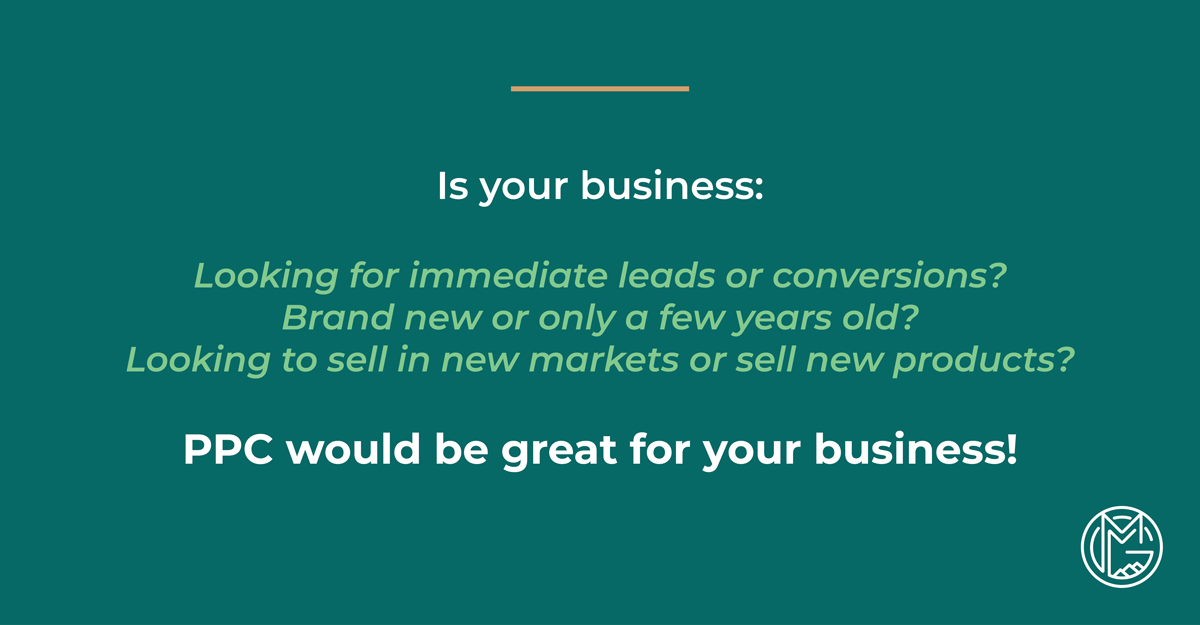
Organic SEO: the benefits, drawbacks, and ideal situations
Organic SEO is a stark contrast in many ways to PPC; the biggest contrast being that SEO utilizes a variety of techniques to drive free and natural traffic from Google directly to your website. The hope is that once users are there, they are moved by your website’s content and purchase your products or services directly or indirectly from your website. Organic SEO uses techniques like content, blogging, backlinking, social media marketing, reviews, and keywords on your site in order to signal Google that you are the perfect match for their customer, the SEARCHER! Compared to a PPC campaign, organic SEO is a long game where it can take months for your site to rank and be found by users looking for something related to what your business does.
Benefits of SEO for your business
Very effective
What might surprise you is that organic SEO is much more effective than PPC. In fact, organic results on Google are five times more likely to be clicked than paid ones through Google Ads. Put another way, 81% of users find your website through an organic result. What’s even more convincing is that SEO is not only more effective but much cheaper when compared to PPC.
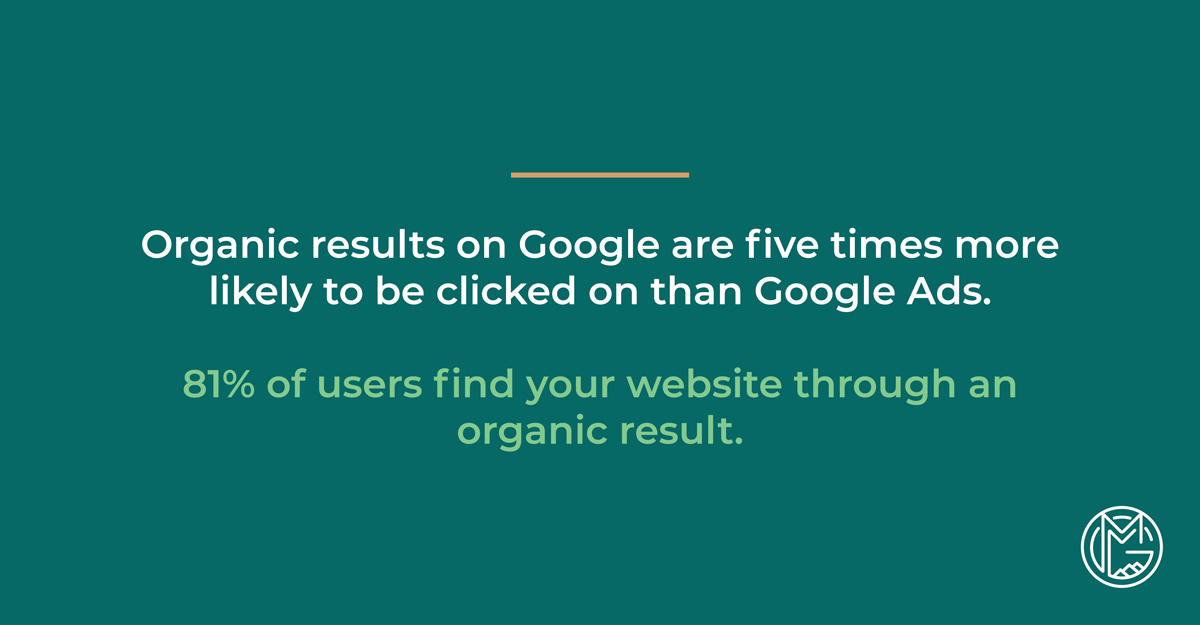
SEO is cheaper than PPC
Because SEO relies on content instead an ad budget, SEO is much cheaper than PPC. With SEO, you’re spending your marketing budget on improving your website’s content and copy with an internal team, freelancers, or a hired marketing agency- not just throwing money at Google Ads and hoping for the best.
Creates long-lasting and stable traffic
Organic SEO focuses on making updates directly on your website that can have long-lasting effects for years to come. At Mountain Mojo Group, some of our Clients have landing pages and blog articles posted 3+ years ago that are responsible for a lion’s share of their incoming web traffic. Once you create a landing page or blog copy, it doesn’t disappear from the internet…it stays with you for as long as you keep it published- and allows for years of benefits.
Drawbacks of SEO for your business
It takes time to see results from SEO
A common misconception about SEO is if you build a landing page or post, it should immediately start ranking on Google. Unfortunately, that is far from the truth. For Google to crawl a new page and index it accordingly can take hours or weeks. And just because a page is crawled doesn’t mean it will rank for what you want it to. It takes time and lots and lots of content for your landing page or post to make leaps and bounds on Google.
Playing off the last point- one landing page or post will not get your site to start driving traffic. Google doesn’t want spammers to build site after site, throw a couple of landing pages and blog posts up, and make a quick buck. They delay rankings for new sites for 3-6 months- known as “The Google Sandbox” period.
SEO never ends
Because of “The Google Sandbox” and the competition for rankings, SEO never ends on a website. You will always need fresh landing pages and blog posts to keep your website’s traffic on an upward trend. While local sites have a little more leeway with SEO (thanks to less competition than businesses who service nationally) we recommend adding 1-2 landing pages and at least three blog posts to your site each month to keep traffic flowing in. To get the most bang-for-your-buck, sites that write and post 16+ blog posts per month see the greatest increase in web traffic.
Can be difficult to compete with the “big dogs”
Want to rank for “lawn mower parts” or “tour guides?” So do a million other businesses. And for those keywords, you’ll never guess who is dominating the organic rankings: Amazon, Angie’sList, Home Depot, YellowPages, eBay, and Lowe’s. These companies spend millions each year with a robust organic SEO, content, and web development team building their SEO empire around those keywords. It can be very difficult to compete for those shorter keywords (also known as “short-tail keywords”).
On the flip side, it is much easier to rank for longer keyword phrases like “Yamaha yt6700 parts” or “Grand Canyon hiking guides.” Those keywords are much easier to go after and generally see less competition from the “big dogs.”
Great situations or circumstances for organic SEO:
Because organic SEO is a long game, it works for all situations on all websites, including yours! In fact, having a website without performing SEO is like having a car but never changing the oil. SEO takes months to work its magic on your website and improve your rankings and drive web traffic. While it’s not a “drop everything and write content for my website” type of task, the sooner you get to it, the sooner you’ll start seeing results.
A blended approach of PPC and SEO works best for businesses
As outlined above, both PPC and SEO can benefit any business looking to capitalize from their website. In fact, increasing your website can increase your revenue so it’s important to actually take advantage of PPC and SEO.
At Mountain Mojo Group, we recommend a blended approach of both PPC and SEO for our Clients. PPC, and its short-game approach, can bring in leads and conversions immediately, while Google “digests” your organic SEO approach. Because SEO is cheaper and more effective than PPC, once your site starts generating more leads and conversions than your PPC campaigns, pull back on your ad spend and increase your SEO game.
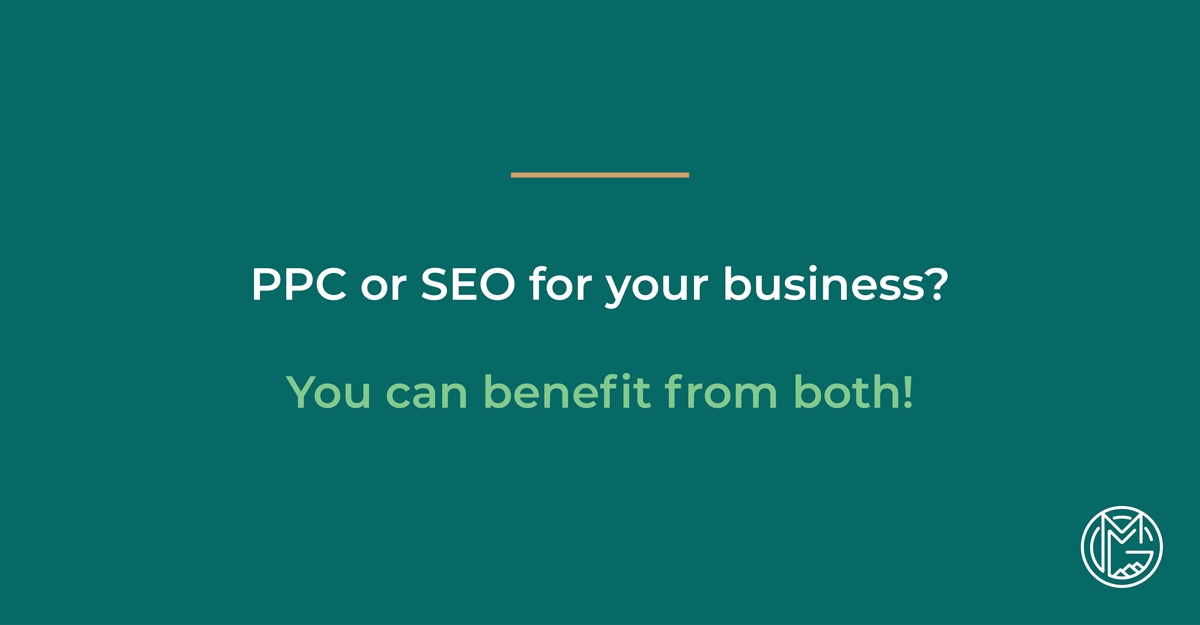
Summarizing
PPC and organic SEO are two very effective digital marketing techniques to help your business rank higher and bring in leads and conversions to your business through your website. It is important to remember that each technique has its positives and negatives and to weigh each option and develop a plan before you get going. PPC can help in the short term but is costly and less effective. Organic SEO is very effective and is cheaper, but takes months to see results, and can be hard to compete against the “big dogs” like Amazon or Wikipedia. If you use both techniques, your website can be a huge source of business.

Mountain Mojo Group is located in Flagstaff, Arizona, and provides top-quality marketing solutions and design! Our team works with small businesses all across the state of Arizona, providing a variety of marketing and design services, including social media management, photography, videography, strategy, web design, graphic design, SEO, and paid search engine marketing. Our team of creatives is ready to tackle your next marketing project. Contact our team today or stop by one of our offices located throughout northern Arizona.

